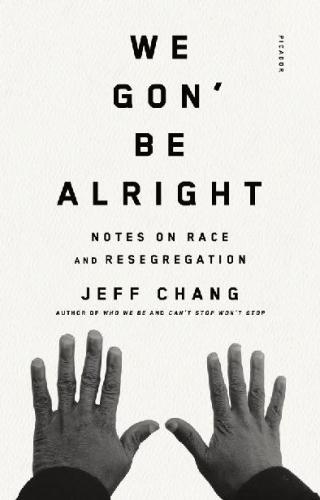
We Gon' Be Alright
Notes on Race and Resegregation
کتاب های مرتبط
- اطلاعات
- نقد و بررسی
- دیدگاه کاربران
نقد و بررسی

September 26, 2016
Chang (Can’t Stop Won’t Stop: A History of the Hip-Hop Generation) sounds the alarm about the “unmistakable lurch back to resegregation” in several spheres since the late ’60s. Each chapter focuses on a different area: higher education practices and policies, campus life, funding for the arts, housing practices and policies, and the criminal justice system. Chang concludes with a challenge to the conventional narrow black/white dichotomy, examining how segregation affects Asian-Americans (“the in-betweens”). As Chang delineates present-day events, he is attentive to historical context; he is at his most provocative, thought-provoking, and informing when laying bare the economic and political structures beneath segregation practices, including the infusion of corporate executives into college management, financial inequities in arts funding, the racial transformation of housing, and the link between local budget revenues and law enforcement practices. His delineation of the “bad loop of history... crisis, reaction, backlash, complacency, crisis” in American race relations constitutes a timely appeal to end a pervasive silence over resegregation. Chang’s title is optimistic, but the content of his book is not.

In this collection, written "in appreciation of all the young people who would not bow down," outspoken journalist Chang (Who We Be: A Cultural History of Race in Post-Civil Rights America, 2014, etc.) offers six critical essays addressing racial inequality and inequity and how these provocative, multifaceted issues impact virtually every culture.Though he acknowledges that race relations continue to negatively emblemize "the permanent fog of a country that repeats the spectacle of fire in every generation," the author explores the potential for cultural change he believes still lies within society's grasp, even while serious issues remain. He asserts that Donald Trump and bands of culture-war extremists have capitalized on "the energies of anxious whites [who] have been diverted from class uprising toward racial division." Chang further considers "the whiteness of Hollywood" and the inherent racial bigotry of the film and TV industries, suburban colorization, and more recent influential work from artists like Beyonce. When absorbed individually, the author's incisive essays will educate and inform readers. Collectively, Chang creates a chain-linked manifesto arguing for an end to racially charged violence and discrimination and urging global open-mindedness to the struggle of the oppressed. Intended as a written response to the Ferguson, Missouri, riots, the book also offers moving observations of those months of unrest and palpably captures the charged atmosphere on the streets and the history-making heft of the protests. Readers seeking remedies to racial discord will instead find a multifaceted history lesson coupled with troubling updates on recent urban upsets within the author's interconnected discourse. With his galvanizing message, Chang reiterates that while there is much work to be done on the inequality front, the opportunity to "get it right" has not passed us by. He implores readers to listen, act, and become involved with today's activists, who offer "new ways to see our past and our present." A compelling and intellectually thought-provoking exploration of the quagmire of race relations. COPYRIGHT(1) Kirkus Reviews, ALL RIGHTS RESERVED.

September 1, 2016
Chang, author of the hip-hop history Can't Stop Won't Stop (2005), tasked with writing a new introduction for Who We Be (2014), instead wrote what became this entire new book of essays on inequality and resegregation in the U.S. With a conclusion devoted to Beyonce's album Lemonade, released this past spring, and references to Donald Trump's presidential campaign, We Gon' Be Alright is an of-the-moment contemplation ripe for the social-media generation. Chang, who directs the Institute for Diversity in the Arts at Stanford University, rests his discussion, extensively underpinned with figures and endnotes, squarely on the politics and policies of the past half-century. He writes, One need not be a pessimist to see the bad loop of history we are caught withincrisis, reaction, backlash, complacency, crisis. Whether his topic is a day-by-day breakdown of the situation in Ferguson, Missouri, after the death of Michael Brown, the birth of the Movement for Black Lives, or his own Asian Americanness, Chang's prose is disarming, provocative, and sure to inspire further thought and research.(Reprinted with permission of Booklist, copyright 2016, American Library Association.)

September 15, 2016
The powerful sentiment "We Gon' Be Alright" has been used by activist Alicia Garza, a cofounder of the Black Lives Matter movement, and by rapper Kendrick Lamar in his Grammy Award-winning song Alright. Journalist and music critic Chang (Can't Stop Won't Stop; Who We Be) continues the spin with this engaging and powerful commentary on America's current race-relations narrative. Chang's essays delve deep, from the segregated history of Ferguson, MO, and St. Louis County to the social unrest that afflicted the nation after the death of Michael Brown in 2014. The author brings historical context to the hashtags #OscarsSoWhite and #NotYourMule, explaining the struggles of underrepresented people in Hollywood. Chang continues by illuminating how gentrification is quietly resegregating neighborhoods and ultimately creating a vast economic divide where black and Latino children remain in poverty-stricken schools. Using Beyonce's Lemonade to draw his conclusion, Chang invites readers to hope and ponder progress along with what it will take to achieve a freedom for all--empowered with love and grace. VERDICT A timely read for anyone interested in the historical context of our current cultural climate. [See Prepub Alert, 3/14/16.]--Angela Forret, Clive P.L., IA
Copyright 2016 Library Journal, LLC Used with permission.

April 1, 2016
Known first as a critic/journalist of hip-hop music and culture--his Can't Stop Won't Stop (2005) won the Before Columbus Foundation's American Book Award--Chang expanded his purview in 2014's Who We Be: The Colorization of America to consider larger issues of social history and multiculturalism in America. Here, he wonders why we keep talking about diversity even as society is resegregating both racially and economically.
Copyright 2016 Library Journal, LLC Used with permission.

























دیدگاه کاربران